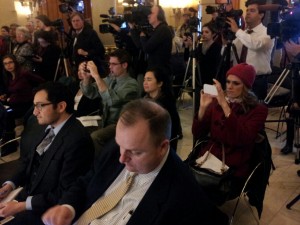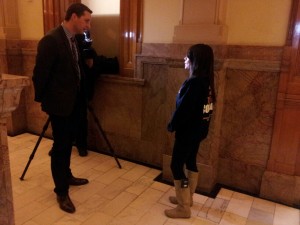Reporters should not spread Gessler’s misinformation that 2013 election law set deadline in recall elections
Friday, August 16th, 2013Correction: This post was corrected to state that the CO Constitution gives recall candidates until 15 days before an election to qualify for the ballot.
—–
What led to the latest court ruling in two recall elections in southern Colorado is an apparent conflict between Colorado’s Constitution, which gives recall candidates until 15 days before the election to qualify for the election ballot, and Colorado law, which gives them 10 days after the election date is set.
But it wasn’t Colorado’s new election modernization law (HB13-1303) that set the 10-day deadline.
It was actually a 2012 law, sponsored by Republican Keith King and Democrat Nancy Todd. It set the 10-day window. Here’s the relevant portion of HB12-1293 that’s now on the books:
1-12-117. Nomination of successor. (1) FOR PARTISAN ELECTIONS, a candidate to succeed the officer sought to be recalled shall meet the qualifications of a party candidate or an unaffiliated candidate as provided in part 8 of article 4 of this title and shall be nominated by a political party petition or an unaffiliated petition as provided in part 9 of article 4 of this title. Nomination petitions MAY BE CIRCULATED BEGINNING THE FIRST DATE ON WHICH A PROTEST MAY BE FILED and
affidavits of intent to run as a write-in candidateshall be filed no later thanfifteenTEN CALENDAR days after thedate on which the appropriate governing body convenes andDESIGNATED ELECTION OFFICIAL sets the election date AS PROVIDED IN SECTION1-12-111.
The Denver Post got it wrong in a Spot blog post yesterday, reporting that the new election law set the 10-day limit, and the Associated Press made the same implication in a story yesterday.
If it weren’t for the 2013 election law, county clerks would have been able to choose not to run an all-mail-in-ballot recall election, because the law mandates all-mail voting. But they still would have had to rely on the 10-day deadline for permanent vote-by-mail voters and for absentee and overseas ballots, including ballots for military personnel. So the statutory conflict with the state constitution would have come up anyway.
In fact the problem would have arose had a recall election occurred anytime since Colorado started using mail ballots in the 1990’s as ColoradoPols has pointed out yesterday, citing former GOP Secretary of State Donetta Davidson.
I can’t blame reporters for being confused, however, when you have the state’s top election official, Scott Gessler, spreading false information about this topic and promoting himself in the process.
On KOA’s Mike Rosen show Aug. 13, Secretary of State Scott Gessler held up himself as white knight who tried to fix the 10-day-deadline problem in the election modernization bill, even though the new law isn’t the cause of the problem. Listen to Gessler here @4 minutes into the recording.
Rosen: “A judge ruled that a provision of the state Constitution, that apparently only applies to a recall election, says that you only have 15 days prior to the election to turn in enough signatures to get your candidate’s name on the ballot. And the lawsuit brought by the Libertarians says instead they were given only 10 days after the Governor set the election date…It’s a little confusing, since the Constitution conflicts with election-reform legislation passed in the last session. Now it all lands back in Secretary of State Scott Gessler’s lap… I gave a brief summary. Put some more details on it. ”
Gessler: “Well, your summary is pretty accurate. We had tried to harmonize the statute and the Constitution. Ironically, I was very much opposed to the legislation that went through last year but found myself in the position where I had to defend it….”
Rosen: “How about the conflict between what the state Constitution says, that apparently applies only to recall elections, and what was in the new legislation passed this year?”
Gessler: “Well, the judge held that it was a conflict. We had tried to harmonize it, but it is what it is. So our approach is, you know, we’ve got to make this work.
Rosen should have Gessler back on his show to explain that the 2013 election-mondernization law did not lead to the latest court ruling in the recall elections, and media outlets who published misleading articles should clarify.



